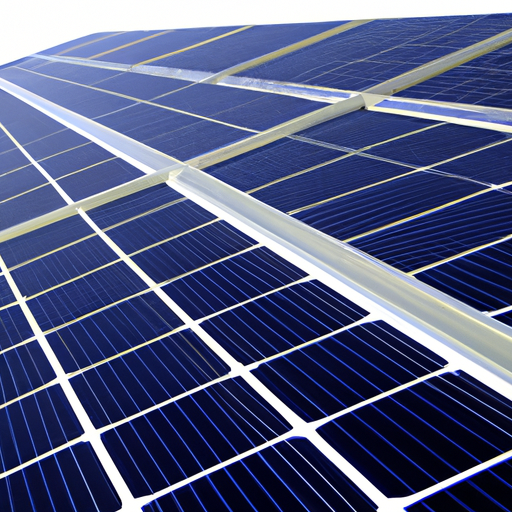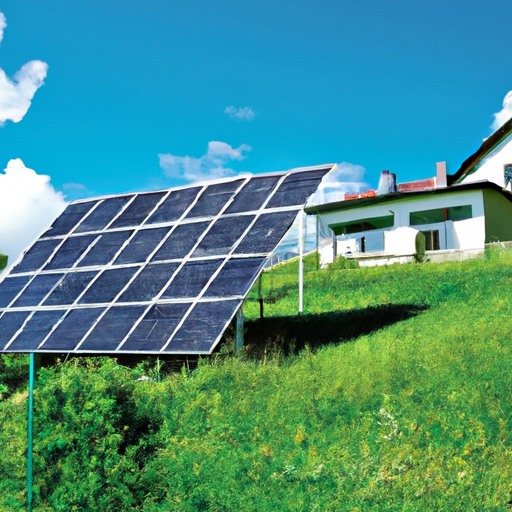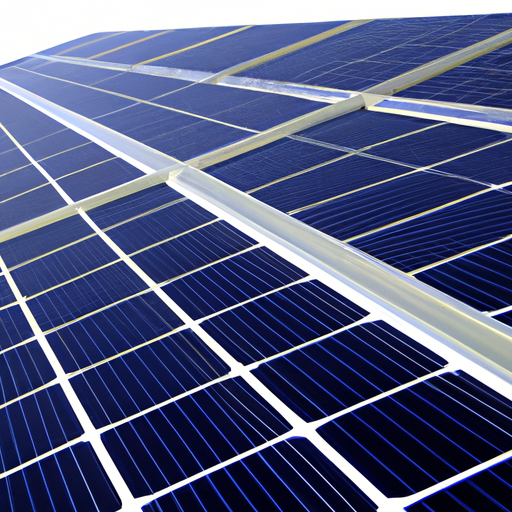Are you considering installing solar panels on your home? One question you might be asking is, “Do I need a permit?” Well, we’ve got the answers for you! In our upcoming article, we’ll dive into the world of solar permits, explaining everything you need to know about the process, the requirements, and how to navigate through it effortlessly. So stay tuned to find out all the details!
At HomeSolarDIY, we understand that going solar can be an exciting but also daunting journey. That’s why we’re here to guide you every step of the way. Whether you’re a DIY enthusiast looking to customize your solar system or a beginner simply curious about how to make the switch to green energy, our website has the resources and information you need. From the basics of understanding solar power to detailed tutorials on setting up your own solar array, we’ve got you covered. So, let us be your trusted companion on your path to a more sustainable, self-sufficient future. Installing solar panels on your home is a great way to harness the power of the sun and reduce your reliance on traditional energy sources. However, before you embark on this green energy journey, it’s crucial to understand whether you need a permit to install solar panels on your home. In this article, we will explore the permit requirements for solar panel installations, the process of obtaining a permit, the benefits of obtaining a permit, common challenges, and solutions, as well as tips for a smooth permitting experience.

Understanding Permit Requirements
Understanding Local Regulations
Before you start the solar panel installation process, it’s important to familiarize yourself with local regulations regarding solar panel permits. Each municipality may have its own set of rules and guidelines that you must adhere to. These regulations are in place to ensure the safety and compliance of solar installations and to minimize any potential negative impacts on the community.
Knowing if a Permit is Required
In most cases, a permit is required for solar panel installations on residential properties. Even if your local regulations do not explicitly state that a permit is required, it is still advisable to obtain one. By obtaining a permit, you can demonstrate that your installation meets all safety and quality standards, giving you peace of mind and protecting your investment.
Types of Solar Panel Permits
There are typically two types of solar panel permits – electrical permits and building permits. Electrical permits focus on the electrical aspects of the installation, ensuring that the wiring and connections are done correctly. Building permits, on the other hand, focus on the structural aspects of the installation, such as roof penetrations and mounting systems. Depending on your location and the complexity of your installation, you may need to obtain one or both types of permits.
Obtaining a Solar Panel Permit
Contacting Local Authorities
To initiate the permit application process, you will need to contact your local authorities, such as your city or county building department, to inquire about the specific requirements and procedures for obtaining a solar panel permit. They will be able to provide you with the necessary forms and information needed to complete your application.
Submitting the Necessary Documents
To obtain a solar panel permit, you will typically need to submit several documents. These may include a detailed system design, engineering drawings, electrical specifications, manufacturer’s specifications, and the necessary permits or approvals from other agencies if required. It’s important to ensure that all the documents are accurate, complete, and comply with local regulations to avoid any delays in the permit approval process.
Paying Permit Fees
In addition to submitting the required documents, you will also need to pay permit fees as part of the application process. The fees vary depending on your location and the size of your solar panel system. These fees contribute to the administration and inspection processes involved in granting permits and ensuring the safety and compliance of the installations. It’s important to factor these fees into your budget when planning your solar panel installation.
Factors Affecting Permit Requirements
Location and Zoning Regulations
One of the main factors that can affect permit requirements for solar panel installations is your location and the zoning regulations in your area. Some municipalities may have stricter requirements for solar installations in historic districts or conservation areas, while others may have more lenient regulations in place. It’s crucial to research and understand the specific regulations that apply to your location before proceeding with your installation.
Size and Capacity of the Solar Panel System
The size and capacity of your solar panel system can also impact the permit requirements. Larger systems may require additional approvals and inspections to ensure their safety and compliance. It’s important to accurately calculate the size and capacity of your system and communicate this information to the permitting authorities during the application process.
Grid Connection and Net Metering
If your solar panel system is connected to the grid and you plan to take advantage of net metering, additional considerations may come into play. Net metering allows you to sell excess electricity generated by your solar panels back to the grid, offsetting your energy consumption. Some utilities may have specific requirements or agreements that need to be established before you can connect your solar panel system to the grid. It’s important to communicate with your utility provider and understand their specific requirements.

Benefits of Obtaining a Permit
Ensuring Safety and Compliance
One of the primary benefits of obtaining a permit for your solar panel installation is ensuring the safety and compliance of your system. Permits are granted after a thorough review of your system design and documentation, ensuring that it meets all the necessary standards and regulations. By obtaining a permit, you can have confidence that your installation is safe and reliable.
Protecting your Investment
Installing a solar panel system on your home is a significant investment, and obtaining a permit can help protect that investment. By going through the permit process, you can demonstrate that your installation is done by professionals and meets all necessary requirements. This can be particularly important if you plan to sell your home in the future, as having the necessary permits can increase its value and appeal to potential buyers.
Qualifying for Incentives and Rebates
In many jurisdictions, obtaining a permit is a requirement for qualifying for incentives and rebates. These incentives can help offset the cost of your solar panel installation, making it more affordable and accessible. By obtaining a permit, you can ensure that you meet all the necessary criteria to take advantage of these beneficial programs.
Common Challenges and Solutions
Dealing with Strict Permit Timelines
Some municipalities may have strict timelines for permit processing, which can cause delays in your installation timeline. To address this challenge, it’s important to ensure that you submit your permit application well in advance, allowing ample time for review and approval. Additionally, staying in regular communication with the permitting authorities can help expedite the process and address any issues or concerns promptly.
Addressing Concerns from Neighbors or HOAs
Another common challenge when installing solar panels is addressing concerns from neighbors or homeowners’ associations (HOAs). Some people may have reservations about the aesthetic impact of solar panels or concerns about their property values. To overcome these challenges, it’s important to educate your neighbors and HOAs about the benefits and advantages of solar energy. Providing them with accurate information and addressing their concerns can help alleviate any objections and gain their support.
Finding Professional Help if Needed
While many solar panel installations can be done as DIY projects, sometimes it may be necessary to seek professional help. If you are unsure about the permit requirements or face complex installation challenges, consulting with a professional solar installer can provide valuable guidance and expertise. They can help navigate the permit application process, ensure compliance with local regulations, and ensure a successful and safe installation.
The Permit Application Process
Preparing a Detailed System Design
To increase the chances of a smooth and timely permit approval, it’s important to prepare a detailed system design. This includes providing accurate measurements, equipment specifications, electrical diagrams, and any necessary engineering drawings. By providing a comprehensive system design, you can demonstrate that your installation meets all the necessary requirements and standards.
Communicating with Local Authorities
Throughout the permit application process, maintaining open and clear communication with the local authorities is crucial. They may have additional questions or require further clarification on certain aspects of your system design. By promptly and effectively communicating with them, you can address any concerns or issues that may arise, reducing the likelihood of delays in the permit approval process.
Following the Review and Approval Process
After submitting your permit application, it will go through a review process where the authorities will assess the documentation and system design for compliance with the regulations. It’s important to be patient and proactive during this stage, as additional information or modifications may be requested. By promptly addressing any requests or feedback from the authorities, you can expedite the approval process and move closer to the installation of your solar panels.
Permit Exemptions and Simplifications
Small-Scale Exemption Limits
In some jurisdictions, there may be exemptions or simplifications for small-scale solar panel installations. These exemptions typically apply to systems below a certain size or capacity, allowing homeowners to bypass the full permit application process. It’s important to research and understand any exemptions or simplifications that may be available in your area to determine if your installation qualifies.
Streamlined Permit Processes for Certain Installations
Another way to simplify the permit application process is through streamlined processes for certain types of installations. For example, some jurisdictions may have specific regulations in place for ground-mounted solar panels or for systems installed on non-residential buildings. These streamlined processes can help expedite the permit approval for such installations, making the process more efficient for homeowners.
Alternative Compliance Options
In some cases, there may be alternative compliance options available that can reduce the need for a full permit application. For example, some jurisdictions may allow inspections by third-party professionals or self-certification by qualified installers. These alternative compliance options can help simplify the permit process while still ensuring safety and compliance.
Tips for a Smooth Permitting Experience
Researching Local Regulations Beforehand
To ensure a smooth permitting experience, it’s important to research and familiarize yourself with the local regulations before starting your solar panel installation. Understanding the specific requirements and guidelines can help you properly plan and prepare for the permit application process. It’s also advisable to reach out to local solar installation companies or industry associations for guidance and advice.
Seeking Professional Guidance if Necessary
If you are unsure about the permit requirements or face complex installation challenges, seeking professional guidance can be beneficial. Consulting with a professional solar installer or a licensed electrician who specializes in solar panel installations can provide valuable expertise and ensure compliance with local regulations. They can guide you through the entire process, including the permit application, design, installation, and final inspection.
Preparing Accurate and Complete Documentation
When applying for a solar panel permit, it’s crucial to provide accurate and complete documentation. This includes detailed system design, engineering drawings, electrical specifications, and any other required information. Inaccurate or incomplete documentation can cause delays in the permit approval process or result in the rejection of your application. Take the time to ensure that all the required documentation is accurate, complete, and complies with local regulations.
Understanding the Inspection Process
Scheduling and Conducting Inspections
Once your solar panel installation is complete, you will need to schedule inspections to ensure that it meets all safety and compliance standards. Depending on your location, you may need to schedule multiple inspections, including electrical, structural, and final inspections. It’s important to coordinate with the local authorities to schedule the inspections at the appropriate stages of your installation.
Addressing Any Required Modifications or Corrections
During the inspection process, the authorities may identify modifications or corrections that need to be made to your installation to ensure compliance. It’s important to address these requirements promptly and effectively to avoid any delays in obtaining the final approval. Working with professionals who have experience in solar panel installations can help ensure that any necessary modifications or corrections are completed properly.
Finalizing the Installation
After successfully completing all the necessary inspections and addressing any required modifications or corrections, you will obtain the final approval for your solar panel installation. At this point, you can finalize the installation by connecting your solar panels to the grid and starting to generate clean and renewable energy for your home.
Conclusion
Installing solar panels on your home is a significant step towards a more sustainable and eco-friendly future. However, it’s important to understand the permit requirements and take the necessary steps to ensure a safe and compliant installation. By familiarizing yourself with local regulations, obtaining the necessary permits, and following the correct procedures, you can enjoy the numerous benefits of solar energy while contributing to a greener planet. Remember, when it comes to solar panel installations, it’s always better to be informed and prepared.

